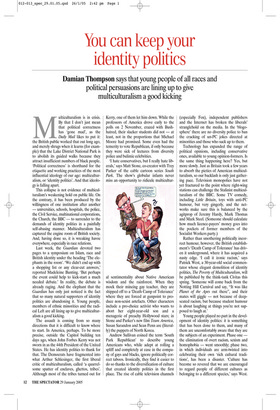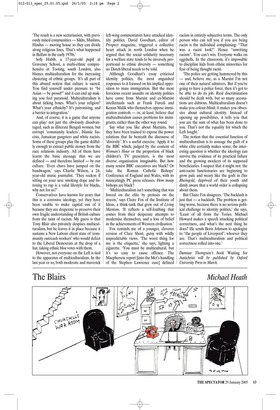You can keep your identity politics
Damian Thompson says that young people of all races and political persuasions are lining up to give multiculturalism a good kicking Multiculturalism is in crisis. By that I don’t just mean that political correctness has ‘gone mad’, as the Daily Mail likes to put it: the British public worked that out long ago, and merely shrugs when it learns (for example) that the Lake District National Park is to abolish its guided walks because they attract insufficient numbers of black people. ‘Political correctness’ is shorthand for the etiquette and working practices of the most influential ideology of our age: multiculturalism, or ‘identity politics’. And that ideology is falling apart.
This collapse is not evidence of multiculturalism’s weakening hold on public life. On the contrary, it has been produced by the willingness of one institution after another — universities, schools, hospitals, the police, the Civil Service, multinational corporations, the Church, the BBC — to surrender to the demands of identity politics in a painfully self-abasing manner. Multiculturalism has captured the engine room of British society. And, having done so, it is wreaking havoc everywhere, especially in race relations.
Last week, the Guardian devoted two pages to a symposium on Islam, race and British identity under the heading ‘The elephants in the room’. ‘We didn’t end up with a shopping list or any clear-cut answers,’ reported Madeleine Bunting. ‘But perhaps the event could help to kick-start a much needed debate.’ In reality, the debate is already raging. And the elephant that the Guardian has only just noticed is the fact that so many natural supporters of identity politics are abandoning it. Young people, members of ethnic minorities and the radical Left are all lining up to give multiculturalism a good kicking.
The assault is coming from so many directions that it is difficult to know where to start. In America, perhaps. To be more precise, outside the Capitol building ten days ago, when John Forbes Kerry was not sworn in as the 44th President of the United States. He has identity politics to thank for that. The Democrats have fragmented into what Arthur Schlesinger, the first liberal critic of multiculturalism, called ‘a quarrelsome spatter of enclaves, ghettos, tribes’. Although most of the tribes turned out for Kerry, one of them let him down. While the professors of America drove early to the polls on 2 November, crazed with Bushhatred, their slacker students did not — at least, not in the proportions that Michael Moore had promised. Some even had the temerity to vote Republican, if only because they were sick of lectures from diversity police and bulimic celebrities.
‘I hate conservatives, but I really hate liberals,’ says Matt Stone, co-creator with Trey Parker of the cable cartoon series South Park. The show’s globular infants never miss an opportunity to ridicule multicultur al sentimentality about Native American wisdom and the rainforest. When they mock their mincing gay teacher, they are shipped off to a ‘Death Camp of Tolerance’ where they are forced at gunpoint to produce non-sexist artefacts. Other characters include a pro-choice activist who wants to abort her eight-year-old son and a menagerie of preachy Hollywood stars; in Stone and Parker’s new film Team America, Susan Sarandon and Sean Penn are (literally) the puppets of North Korea.
Andrew Sullivan coined the term ‘South Park Republican’ to describe young Americans who, while adept at rolling a spliff and completely at ease in the company of gays and blacks, ignore politically correct taboos. Ironically, they find it easier to do so thanks to the diversification of culture that created identity politics in the first place. The rise of cable television channels (especially Fox), independent publishers and the Internet has broken the liberals’ stranglehold on the media. In the ‘blogosphere’ there are no diversity police to ban the cracking of un-PC jokes directed at minorities and those who suck up to them.
Technology has expanded the range of political opinions, including conservative ones, available to young opinion-formers. Is the same thing happening here? Yes, but more slowly. Just as Britain took a few years to absorb the pieties of American multiculturalism, so our backlash is only just gathering pace. Television monopolies have not yet fractured to the point where right-wing stations can challenge the Stalinist multiculturalism of the BBC. Some TV comedy, including Little Britain, toys with anti-PC humour, but very gingerly, and the networks make sure this is balanced by the agitprop of Jeremy Hardy, Mark Thomas and Mark Steel. (Someone should calculate how much licence-payers’ money goes into the pockets of former members of the Socialist Workers party.) Rather than smothering politically incorrect humour, however, the British establishment’s ‘Death Camp of Tolerance’ has driven it underground, where it has acquired a nasty edge. ‘I call it ironic racism,’ says Patrick West, a 30-year-old social commentator whose elegant demolition of identity politics, The Poverty of Multiculturalism, will be published by the think-tank Civitas this spring. ‘Someone will come back from the Notting Hill Carnival and say, “It was like Planet of the Apes out there”, and their mates will giggle — not because of deepseated racism, but because student humour is about laughing at things you’re not supposed to laugh at.’ Young people played no part in the development of identity politics: it is something that has been done to them, and many of them are uncomfortably aware that they are the subjects of an experiment. Phase one the elimination of overt racism, sexism and homophobia — went smoothly; phase two, in which individuals are arm-twisted into celebrating their own ‘rich cultural traditions’, has been a disaster. ‘Culture has become so revered that we are encouraged to regard people of different cultures as belonging to a different species,’ says West. ‘The result is a new sectarianism, with previously mixed communities — Sikhs, Muslims, Hindus — moving house so they can divide along religious lines. That’s what happened in Belfast in the early 1970s.’ Sofy Habib, a 17-year-old pupil at Graveney School, a multi-ethnic comprehensive in Tooting, south London, also blames multiculturalism for the increasing clustering of ethnic groups. ‘It’s all part of this absurd notion that culture is sacred. You find yourself under pressure to “be Asian — be proud!” and it can end up making you feel paranoid. Multiculturalism is about ticking boxes. What’s your religion? What’s your ethnicity? It’s patronising, and a barrier to integration.’ And, of course, it is a game that anyone can play: not just the obviously disadvantaged, such as illiterate Bengali women, but corrupt ‘community leaders’, Islamic fascists, Jamaican gangsters and white racists. Some of these groups play the game skilfully enough to extract public money from the race relations industry. All of them have learnt the basic message that we are defined — and therefore limited — by our culture. ‘Even chavs have jumped on the bandwagon,’ says Charlie Wilson, a 24year-old music journalist. ‘They reckon if sitting on your arse smoking dope and listening to rap is a valid lifestyle for blacks, why not for us?’ Conservatives have known for years that this is a corrosive ideology, yet they have been unable to make capital out of it because they are desperate to preserve their own fragile understanding of British culture from the taint of racism. My guess is that Tony Blair also privately despises multiculturalism, but he leaves it in place because it sustains a New Labour client state of ‘community outreach workers’ who would defect to the Liberal Democrats at the drop of a hat, taking ethnic bloc votes with them.
However, not everyone on the Left is tied to the apparatus of multiculturalism. In the last year or so, both moderate and maverick left-wing commentators have attacked identity politics. David Goodhart, editor of Prospect magazine, triggered a collective heart attack in north London when he argued that the social solidarity necessary for a welfare state tends to be inversely proportional to ethnic diversity — something no Dutch liberal needs to be told.
Although Goodhart’s essay criticised identity politics, the most anguished responses to it focused on his implied opposition to mass immigration. But the most ferocious recent assaults on identity politics have come from Marxist and ex-Marxist intellectuals such as Frank Furedi and Kenan Malik who themselves oppose immigration controls — or, at least, believe that multiculturalism causes problems for immigrants, rather than the other way round.
Say what you like about Marxists, but they have been trained to expose the power relations that lie beneath the discourse of ‘diversity’. It’s a useful exercise. Apply it to the BBC which, judged by the content of Woman’s Hour or the proportion of black children’s TV presenters, is the most diverse organisation imaginable. But how many senior BBC executives are black? Or take the Roman Catholic Bishops’ Conference of England and Wales, with its nauseatingly PC press releases. How many bishops are black?
‘Multiculturalism isn’t something that was forced on the elite by protests on the streets,’ says Claire Fox of the Institute of Ideas, a think-tank that grew out of Living Marxism. ‘It reflects a self-loathing that comes from their desperate attempts to modernise themselves, and a loss of belief in the achievements of Western civilisation.’ Fox reminds me of a younger, cleverer version of Clare Short, gutsy with wildly unpredictable views. ‘The worst thing for me is the etiquette,’ she says, lighting a cigarette. ‘You must be multicultural, but it’s so easy to cause offence. The Macpherson report [into the Met’s handling of the Stephen Lawrence case] defined racism in entirely subjective terms. The only person who can tell you if you are being racist is the individual complaining: “That was a racist look!” Hence “unwitting racism”. You can’t win. Everyone walks on eggshells. In the classroom, it’s impossible to discipline kids from ethnic minorities for fear of being thought racist.
‘The police are getting hammered by this — and, believe me, as a Marxist I’m not one of their natural admirers. But if you’re going to have a police force, then it’s got to be able to do its job. Real discrimination should be dealt with, but so many accusations are dubious. Multiculturalism doesn’t make you colour-blind; it makes you obsessive about cultural identity. Instead of opening up possibilities, it tells you that you are the sum of what has been done to you. That’s not the equality for which the Left fought.’ The notion that the essential function of multiculturalism is to assuage the guilt of a white elite certainly makes sense; the interesting question is whether the ideology can survive the evidence of its practical failure and the growing mockery of its supposed beneficiaries. I suspect that it might not: the anti-racist functionaries are beginning to grow pale and weary like the gods in Das Rheingold, deprived of their youth and dimly aware that a world order is collapsing about them.
But Claire Fox disagrees. ‘The backlash is just that — a backlash. The problem is getting worse, because there is no serious political challenge to identity politics,’ she says. ‘Least of all from the Tories. Michael Howard makes a speech attacking political correctness, and what’s the next thing he does? He sends Boris Johnson to apologise to “the people of Liverpool”, whoever they are. That’s multiculturalism and political correctness rolled into one.’ Damian Thompson’s book Waiting for Antichrist will be published by Oxford University Press in March.
















































 Previous page
Previous page